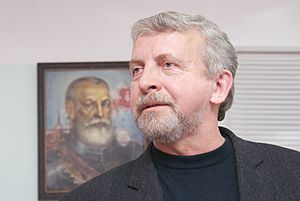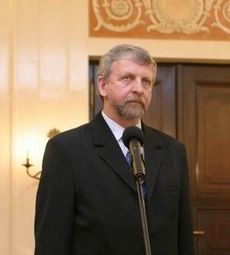Alaksandar Milinkievič facts for kids
Quick facts for kids
Alaksandr Milinkievič
|
|
|---|---|
| Аляксандр Мілінкевіч Александр Милинкевич |
|

Milinkievič in 2009
|
|
| Born | 25 July 1947 Grodno, Byelorussian SSR, Soviet Union
|
| Nationality | Belarusian |
| Alma mater | University of Grodno |
| Occupation | Politician |
| Known for | Presidential candidate (2006) |
| Spouse(s) | Inna Kuley |
| Children | 2 |
Alaksandar Uładzimieravič Milinkievič (born July 25, 1947) is a politician from Belarus. He is best known for running for president in 2006. He was chosen by the main opposition parties to challenge the president at the time, Alexander Lukashenko. An opposition party is a group that has different ideas from the party in power.
Contents
Early Life and Career
Alaksandr Milinkievič was born in the city of Grodno. He studied at the University of Grodno and later earned his Ph.D. in physics.
For a few years, he worked as a professor. He taught at the University of Grodno and also at the University of Sétif in Algeria. Later, he became involved in his city's government and eventually became the deputy mayor of Grodno.
In 2001, he helped manage the presidential campaign for another opposition leader, Siamion Domash.
Running for President in 2006
In October 2005, different opposition groups in Belarus came together to choose one person to run against President Lukashenko. They chose Alaksandr Milinkievič. Their goal was to unite behind a single candidate to have a better chance in the election.
Milinkievič was inspired by events in the neighboring country of Ukraine, where a large movement called the "Orange Revolution" had brought a new leader to power. He hoped something similar could happen in Belarus.
However, running for president was not easy. The government controlled the media, so it was hard for Milinkievič to share his message with the people of Belarus. He was only allowed to give one speech on television before the election.

Gaining International Support
Even though he had little access to media in his own country, Milinkievič traveled to meet with leaders across Europe. He met with politicians from France, Poland, Lithuania, and Germany. He also met with leaders of the European Union. These meetings helped bring international attention to his campaign.
Election Results
In the 2006 election, the official results showed that Milinkievič received 6% of the vote, while President Lukashenko received 83%. The UN Human Rights Committee later said that Milinkievič's rights were violated when his campaign flyers were taken away from him.
Awards and Recognition
For his work promoting democracy and human rights, Alaksandr Milinkievič has received several important awards.
- In December 2006, the European Parliament gave him the Sakharov Prize for Freedom of Thought.
- He also received the Hanno R. Ellenbogen Citizenship Award from the Prague Society for International Cooperation.
Personal Life
Alaksandr Milinkievič is married to Inna Kuley and has two sons from a previous marriage. Besides his native Belarusian, he can also speak Polish, French, and Russian.
Challenges Faced
As an opposition leader, Milinkievič faced many difficulties. He was often stopped and questioned by the police.
- In April 2006, he was put in jail for 15 days for participating in a public gathering that the government had not approved.
- On several other occasions, he was detained by police for various reasons, such as being accused of having an incorrect passport or being questioned about traffic incidents.
- In 2007, he was fined for leaving the country, which he called "revenge by Lukashenko."
See also
 In Spanish: Aleksandr Milinkevich para niños
In Spanish: Aleksandr Milinkevich para niños
- Knight of Freedom Award
 | James Van Der Zee |
 | Alma Thomas |
 | Ellis Wilson |
 | Margaret Taylor-Burroughs |

